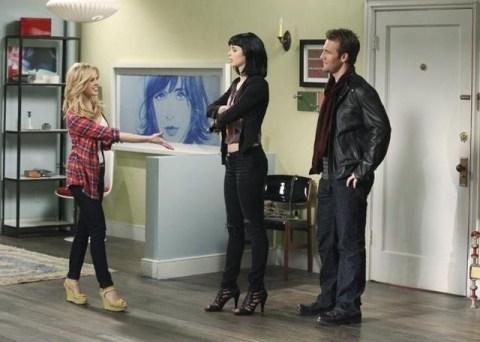[Cecilia Razak is another writer, new to TVWW, we're happy to present to you -- with a smart take on an ABC comedy series that, in just a few weeks, has distinguished itself from the pack, in ways she's noticed already… -DB]
By Cecilia Razak
My expectations of Don’t Trust the B---- in Apt. 23 were not high. In fact, I was ready to hate it. The premise seemed hackneyed, and the title smacked dangerously of cavalier misogyny. Instead, the titular B in apartment 23 turned out to be not so b-----y. In fact, dubious premise and title aside, Apt. 23 is smart, wicked, and surprisingly funny.
June Colburn (Dreama Walker) has moved to New York to work at her dream job, in her job-supplied dream apartment. The show waits a solid two minutes before it pulls the rug (and job, and apartment) smartly and swiftly from beneath her feet. Out of respect, it waits another five to take away her boyfriend.

So June moves in with Chloe (Krysten Ritter, whom you’ll recognize as the B from Breaking Bad). Chloe is a wonderfully twisted character, narcissistic and self-centered, with no morals and even fewer scruples. With all her bitchery, she manages to avoid being a stereotype by being a bitch in her own wicked, creative right. This is not your normal, catty girl TV show. The claws Chloe bares are depraved, wacky and imaginative. In the space of the first three episodes, she sleeps with June’s fiancée on top of her birthday cake, sells all of June’s furniture and acquires a foster child (which she leaves to June to raise). Chole doesn’t talk about June behind her back or emotionally undermine her with veiled comments, but she does manipulate her into buying a drug-laced ottoman.
Most of the humor lies in the fact that Apt. 23 hews closely to traditional sitcom structure and sunny outlook, all while cheerfully demolishing its main character. June gains something perfect in the first five minutes of the show, and the next twenty-five are spent gleefully knocking down, stomping on and thoroughly reducing that something perfect to rubble. It’s edgy and twisted while still being funny and surprisingly good-natured. Chloe may ruin June’s life over and over again, but in the end, she always accepts (a modicum of) responsibility for whatever tragedy she’s caused, and learns a valuable lesson. That it’s almost always the wrong lesson is beside the point.
Apt. 23 is a product of its economic times, and it manages to draw a lot of humor from the current financial climate. June loses her job as she’s walking into it, and her apartment only after she’s had a chance to see how nice it is. It’s her last glimpse of how the 1% live. The financial firm she was hired by tanks, leaving all of its workers unemployed. The man who was going to be her high-level mentor ends up as a barista at a coffee shop. “Can’t have a gap in the resume,” he says with a bland smile. When June can’t find a job, he fires another barista and hires June instead. One more person out of work, one more underemployed recent graduate. When June does manage to get an internship at a financial firm, it’s the unpaid, coffee-running, dry-cleaning-fetching, 60-hour work week from hell. Her boss fires her when she finds out about June’s foster child. Her other assistant, she says, is more valuable because of her “inhospitable womb.”

Most of the show’s secondary characters are funny and refreshingly callous in this same way. James Van Der Beek plays a version of himself, and I say a “version,” because no one in real life could be this sincerely insensitive and snarky. He plays Chloe’s best friend and (as in real life) a former star of Dawson’s Creek. It’s wonderful when celebrities come out to play themselves as assholes, and Van Der Beek is deliciously self-absorbed: he's capable of being thoughtful and earnestly engaged, as long as the subject is himself.
June is one of the few characters who isn’t like this. She’s sweet, naïve, hardworking and thoughtful, all with a classic Midwestern twang. For it, she is continually and routinely punished. Nice guys definitely finish last in apartment 23. Luckily for us, we get to watch them succumb to some of the most engaging bitchery this side of Mean Girls.
--
Cecilia Razak is a Philadelphia-based writer and editor. She writes arts and entertainment criticism, news and culture articles for online media, including the Philly Post, Noupe and Flixist. She's managed web content for non-profits including the Philadelphia Orchestra, University City District, and Wistar Institute and maintained websites for interactive firms such as Bluecadet.